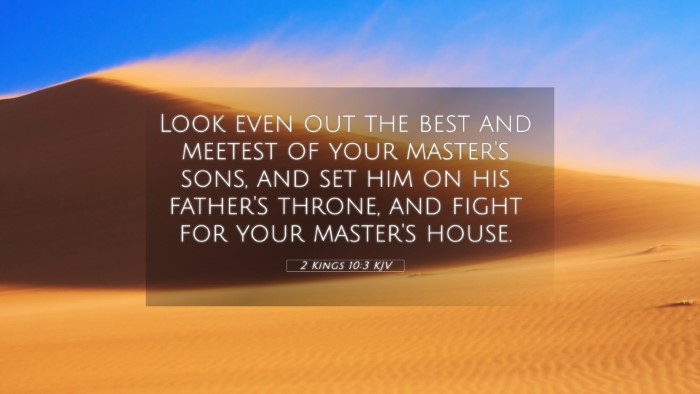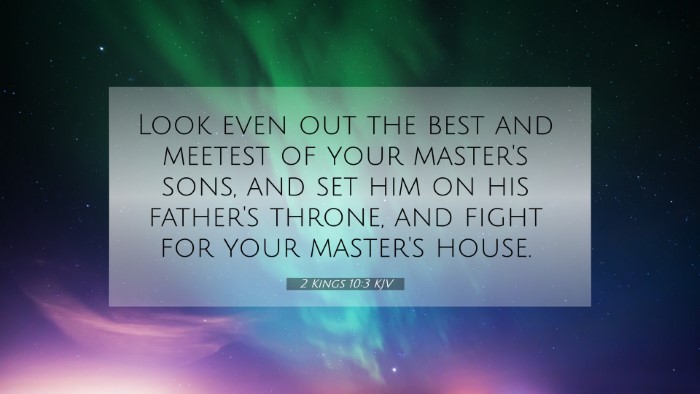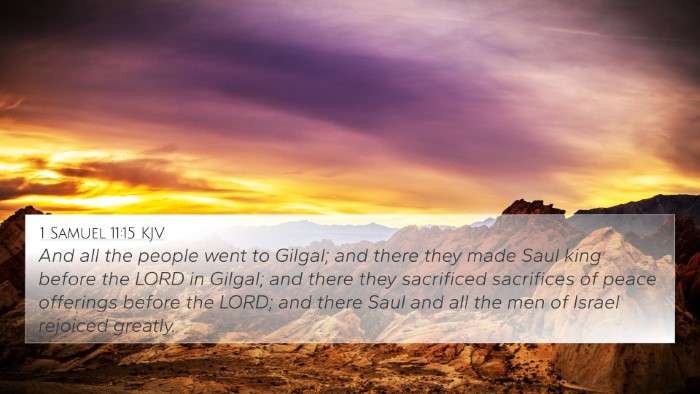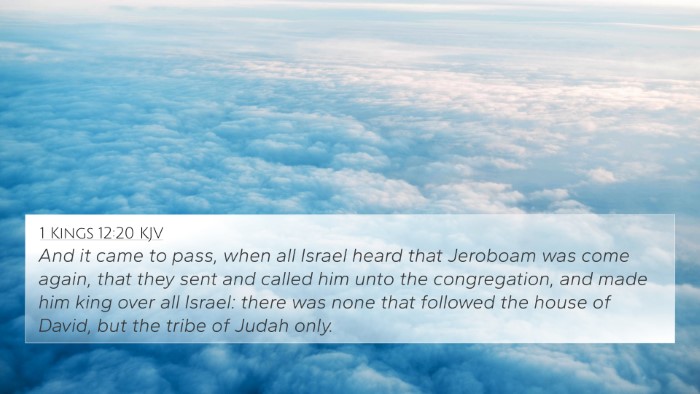Understanding 2 Kings 10:3
2 Kings 10:3 states: "Choose the best and fittest of your master's sons, and set him on his father's throne: and fight for your master's house." This verse emerges in the context of transitioning power and the zeal associated with serving or defending a lord's house. Below, we will explore comprehensive insights derived from public domain commentaries by Matthew Henry, Albert Barnes, and Adam Clarke.
Contextual Background
This verse occurs during a significant turning point for Israel's monarchy, specifically under the reign of Jehu. The socio-political atmosphere within the nation was tumultuous; Jehu was called to eliminate the house of Ahab and bring judgment upon it. The emphasis on fighting for one's master’s house encapsulates both loyalty to leadership and the gravity of political power struggles.
Commentary Insights
-
Matthew Henry's Commentary:
Matthew Henry notes that the call to select the best and most capable heir reflects the need for strong leadership during chaotic times. Jehu's directive reinforces the obligations of both loyalty and proactive measures in safeguarding one’s cause. Henry emphasizes the moral duty to act meticulously in selecting suitable leadership.
-
Albert Barnes' Notes:
Barnes points out that Jehu’s order was not merely a political maneuver but also a divine directive to fulfill prophecy regarding Ahab's lineage. Barnes articulates the weight of accountability that falls upon those who are in positions of power, advocating for careful discernment in leadership choices, particularly in turmoil.
-
Adam Clarke's Commentary:
Clarke interprets this verse as a tactical challenge. He reflects on the possibility of internal betrayal and the necessity for unequivocal loyalty among the ranks. Clarke highlights that the call to arms is not only for physical battle but also for the spiritual vigilance required in periods of instability.
Thematic Connections
2 Kings 10:3 resonates with a broader theme in Scripture regarding leadership, loyalty, and responsibility. Several other Bible verses echo similar sentiments:
- 1 Samuel 16:7 - "For the LORD sees not as man sees: man looks on the outward appearance, but the LORD looks on the heart." This verse emphasizes the importance of Godly discernment in selecting leaders.
- Proverbs 28:12 - "When the righteous triumph, there is great glory; but when the wicked rise, people hide themselves." This indicates the direct correlation between leadership quality and societal outcomes.
- Matthew 20:26-27 - "It shall not be so among you. But whoever would be great among you must be your servant, and whoever would be first among you must be your slave." This highlights the servant leadership model, opposing tyranny.
- 2 Chronicles 23:3 - "And all the assembly made a covenant with the king in the house of God." The theme of collective commitment to leadership is strong in both passages.
- Luke 14:31 - "Or what king, going out to encounter another king in war, will not sit down first and deliberate whether he is able with ten thousand to meet him who comes against him with twenty thousand?" This speaks to the need for strategic planning in leadership.
- 1 Timothy 3:1-2 - "The saying is trustworthy: If anyone aspires to the office of overseer, he desires a noble task. Therefore an overseer must be above reproach..." This underscores the qualities expected in a leader.
- Hebrews 13:17 - "Obey your leaders and submit to them, for they are keeping watch over your souls, as those who will have to give an account." This reinforces the sacred duty of leadership as well as the responsibility of those led.
Practical Application
Understanding 2 Kings 10:3 offers profound insights into modern leadership dynamics. The moral imperative to select capable and faithful leaders remains relevant, be it in religious, political, or social structures. Discernment, loyalty, and courage are pivotal in building a dedicated following or community, paralleling the Biblical examples laid out above.
How to Use Cross-References in Bible Study
Leveraging Bible concordances and Bible cross-reference guides can enhance your study of passages like 2 Kings 10:3. Here are some practical tips:
- Identify Themes: Scan for recurring themes within a passage. Themes of leadership, loyalty, and the consequences of power struggles are apparent in this verse.
- Utilize Bible Reference Resources: Tools like cross-reference systems can help connect similar verses across the Old and New Testament.
- Engage in Comparative Bible Verse Analysis: Compare parallel accounts, such as those found in Chronicles or the Gospels, to deepen understanding of significant Biblical themes.
- Explore Inter-Biblical Dialogue: Look for how various verses comment on or illustrate each other, enriching the context and application of your study.
Conclusion
In summary, 2 Kings 10:3 serves as a powerful reminder of the weight of leadership choices and the spiritual battles associated with them. Using cross-referencing tools and understanding thematic connections in Scripture can illuminate the enduring relevance of Biblical texts. The ongoing discourse on leadership maintains its vital place within the fabric of both ancient and modern life.










